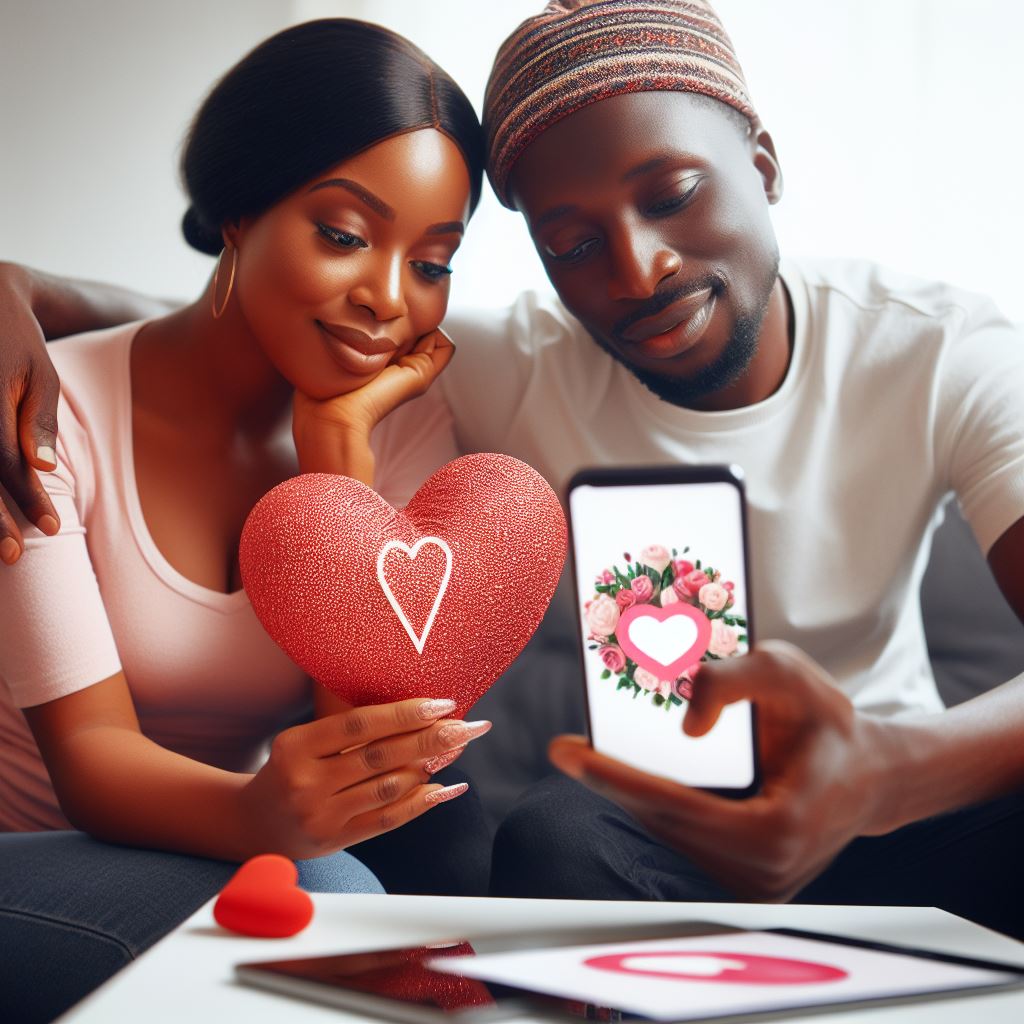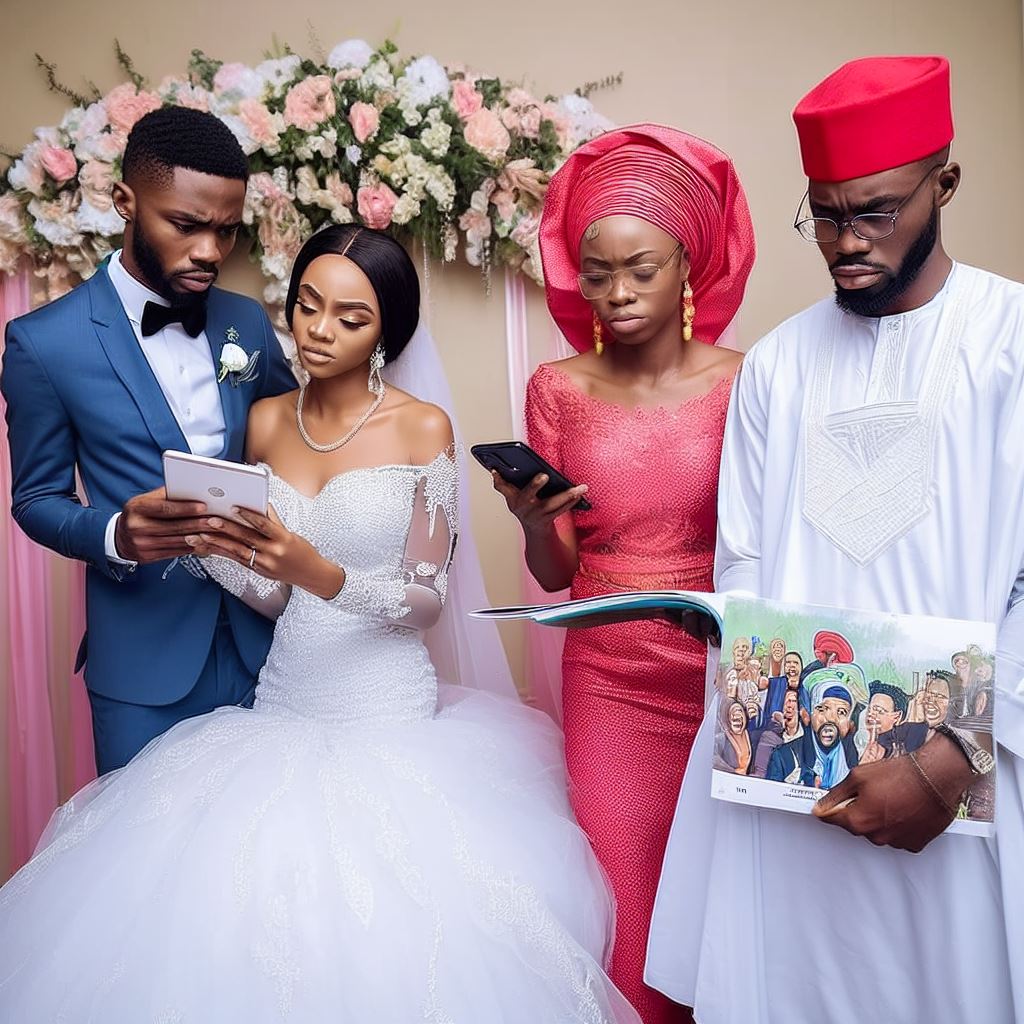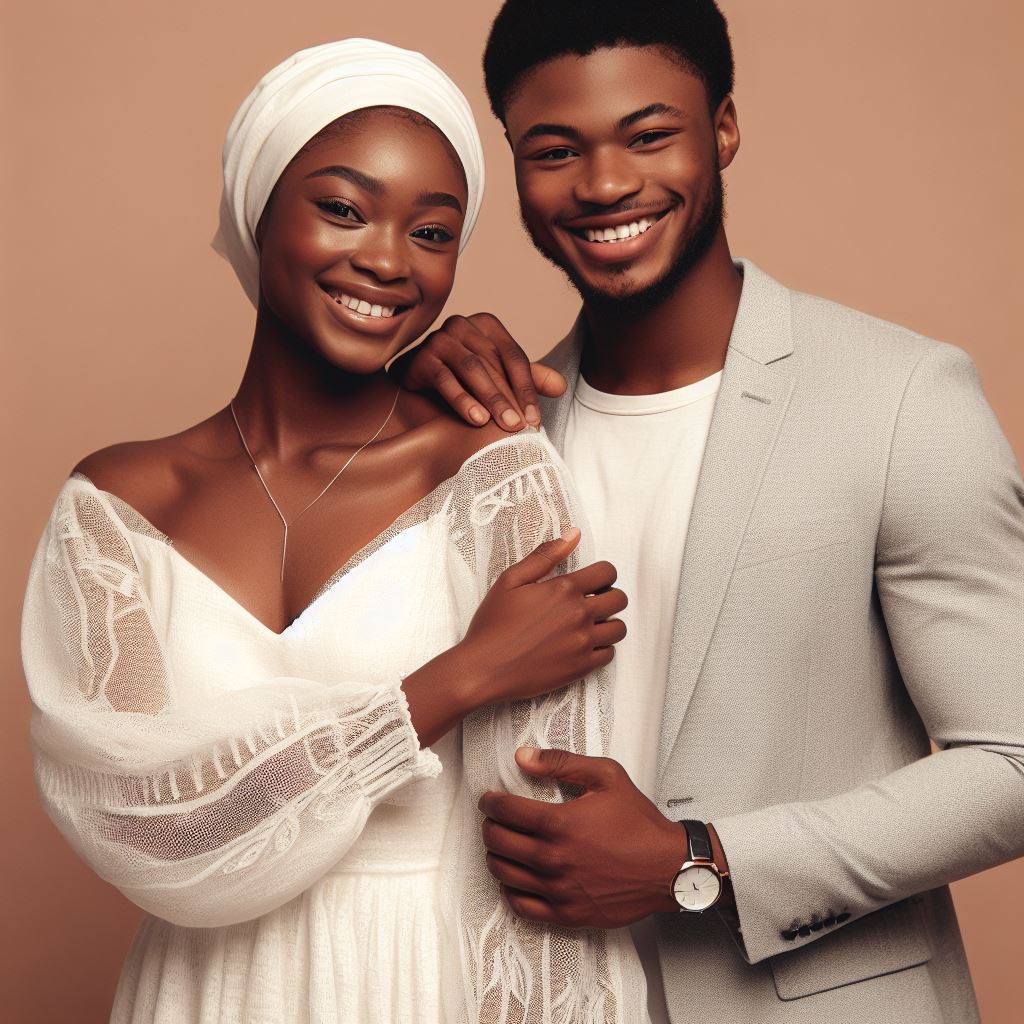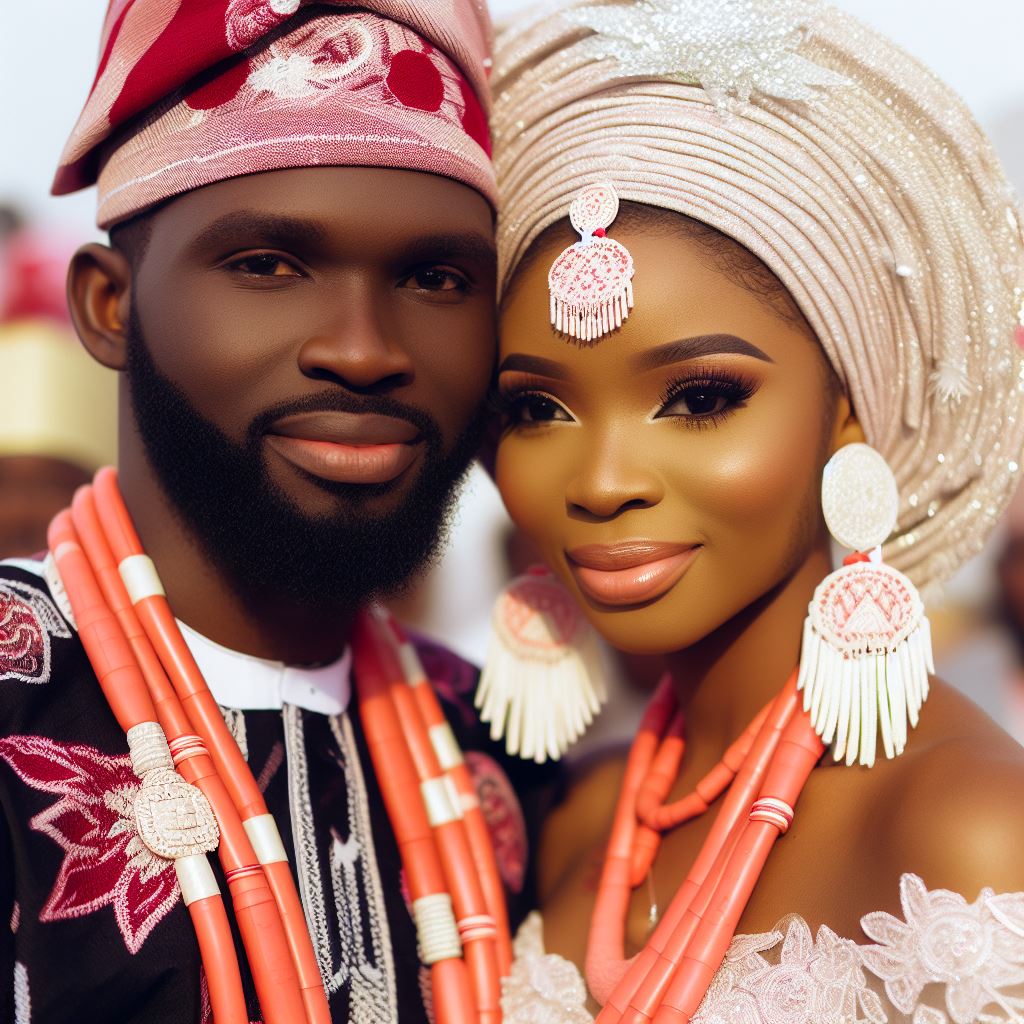Introduction
In Nigeria, a wedding is more than just a union of two individuals; it’s a vibrant tapestry of culture and love.
Weddings hold immense significance in Nigerian culture, symbolizing not only the union of two hearts but the merging of diverse traditions.
Nigerian weddings are a grand celebration, a coming together of families, a showcase of rich heritage, and a testament to enduring love.
From the colorful attires that represent various ethnic groups to the rhythmic beats of traditional music and the flavorful array of dishes, every element tells a unique story.
These celebrations are a reflection of the nation’s diversity, with over 250 ethnic groups, each contributing its distinct flavor to the grand mosaic of Nigerian weddings.
In this section, we will delve into the fascinating world of Nigerian weddings, exploring the customs, traditions, and the deep-rooted love that makes them truly remarkable.
Traditional Nigerian Wedding Customs
Nigerian weddings are deeply rooted in customs and traditions, which play a significant role in the celebration of love and the union of two individuals.
These customs hold great importance and are cherished by Nigerian communities as a way to honor their heritage and preserve their cultural identity.
The Engagement Ceremony
One of the most important traditional customs in Nigerian weddings is the engagement ceremony.
This ceremony marks the formal agreement and commitment between the families of the bride and groom.
It is a joyous occasion filled with lively music, dance, and feasting.
During the engagement ceremony, the groom’s family presents gifts such as kola nuts, wine, and money to the bride’s family as a symbol of appreciation and respect.
This gesture signifies the acceptance of the groom into the bride’s family and community.
The Bride Price
Another significant tradition in Nigerian weddings is the payment of the bride price.
This custom involves the groom and his family presenting gifts and a sum of money to the bride’s family as a token of gratitude for raising their daughter.
The bride price is seen as a way to honor and respect the bride’s family.
The negotiation of the bride price is a traditional and celebratory event, where both families come together to discuss the terms.
It is a symbol of unity and signifies the union of not only the couple but also their families and communities.
Traditional Attire
Nigerian weddings are known for their vibrant and elaborate traditional attire.
The bride typically wears a colorful and intricately designed outfit called a “iro and buba” or a “gele.”
The groom, on the other hand, wears a traditional agbada or babanriga, often made from richly patterned fabrics.
The attire worn by the couple reflects their cultural heritage and adds a touch of elegance and grandeur to the wedding ceremony.
It also serves as a way to showcase the beauty and diversity of Nigerian traditional fashion.
The Role of Family and Community
Nigerian weddings are not just about the union of two individuals but also about the coming together of families and communities.
Family and community play an integral role in these weddings, contributing to the planning, organization, and execution of the various customs and traditions.
The families take great pride in their involvement, as it reinforces the bonds and relationships between kin and community members.
The support and presence of loved ones make Nigerian weddings a joyful and memorable celebration, filled with love, laughter, and togetherness.
In short, traditional Nigerian wedding customs hold a special place in the hearts of Nigerians.
These customs showcase their rich cultural heritage and serve as a means of honoring their ancestry and identity.
From the engagement ceremony to the traditional attire, every aspect of these weddings reflects the values, customs, and traditions that have been passed down through generations.
The involvement of family and community further emphasizes the importance of unity and togetherness in celebrating love and the creation of new beginnings.
Read: Disputing a Marriage Contract in Nigeria: Steps to Take
Religious Influence in Nigerian Weddings
Nigerian weddings are deeply influenced by religion, particularly Christianity and Islam.
Both religions play a significant role in shaping the customs and practices observed during weddings.
Christianity, being the predominant religion in Nigeria, has a major impact on wedding ceremonies.
Most Nigerian Christian weddings start with a church ceremony that is conducted by a pastor.
The ceremony includes Bible readings, prayers, and the exchange of vows between the couple.
Religious Traditions in Christian and Islamic Weddings
Christian weddings often incorporate hymns and worship songs that are sung by the congregation.
The couple may also participate in a Holy Communion ceremony to symbolize their commitment to Christ.
Islam, the second-largest religion in Nigeria, also influences wedding traditions in the country.
Islamic weddings, known as Nikah, are conducted by an Imam and usually take place in a mosque.
The ceremony involves the recitation of verses from the Quran and the exchange of marriage vows.
The groom then pays a dowry, known as Mahr, to the bride as a symbol of his commitment and responsibility.
During the Nikah, family and friends gather to witness the union and offer prayers for the couple.
Religious ceremonies are not limited to the wedding day but extend to pre-wedding and post-wedding events.
Both Christian and Muslim couples often have pre-wedding counseling sessions with their religious leaders.
These sessions help to prepare the couple for marriage and provide guidance on their roles and responsibilities.
After the wedding, religious ceremonies, such as thanksgiving services and blessings, may be held.
These ceremonies are an opportunity for the couple to express their gratitude and seek blessings for their marriage.
Religious Customs and Attire in Nigerian Weddings
Religious weddings in Nigeria are marked by various customs and rituals that hold deep significance.
For example, in Igbo Christian weddings, the bride’s family presents a Bible and kola nut as a symbol of unity.
In Yoruba Muslim weddings, the couple performs the Owo Ori ritual, where they pray for prosperity and a blissful marriage.
Religion not only influences the ceremonies themselves but also the overall atmosphere and attire of Nigerian weddings.
Church weddings are usually more formal, with the bride wearing a white gown and the groom in a suit.
Mosque weddings, on the other hand, are often more modest, with the bride wearing a hijab and a traditional outfit.
In review, the influence of religion, particularly Christianity and Islam, is profound in Nigerian weddings.
Religious ceremonies, customs, and rituals all contribute to the rich tapestry of culture and love that embodies these celebrations.
Read: Including Children in Your Nigerian Marriage Agreement
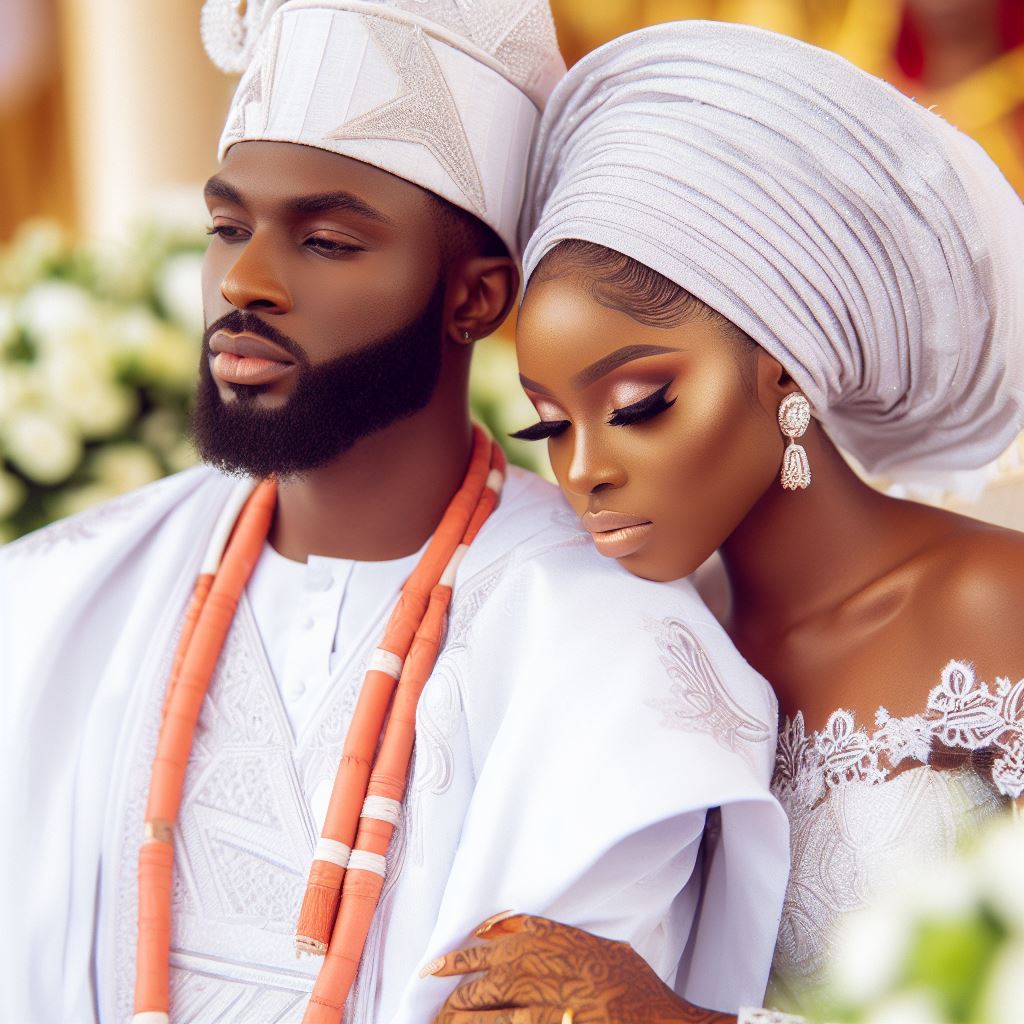
Diverse Cultural Influences
Nigerian weddings are a vibrant tapestry of culture, reflecting the country’s rich diversity through customs and traditions.
- Over 250 ethnic groups bring unique customs to these celebrations.
- Yoruba weddings feature the “Introduction” ceremony, exchanging gifts.
- Igbo weddings highlight the “Igba Nkwu” ceremony with palm wine.
Food, music, and dance encompass various cultural backgrounds in Nigerian weddings.
- Traditional dishes like jollof rice and egusi soup are served.
- Energetic music with traditional instruments and captivating dances create a vibrant atmosphere.
Modern Nigerian weddings blend Western and traditional elements.
- Brides and grooms may opt for white wedding attire alongside cultural customs.
- The fusion of diverse traditions bridges gaps and celebrates unity.
Nigerian weddings celebrate love, culture, and heritage, showcasing the country’s rich tapestry with colors, music, and delicious food.
Read: Amending a Marriage Contract: When and How in Nigeria
See Related Content: Highlighting Love: Nollywood Movies & Anniversary Themes
Modern Elements in Nigerian Weddings
Modernity and globalization have notably affected Nigerian weddings, with Western elements and technological advancements reshaping these celebrations.
- Western Influences: Nigerian couples embrace Western wedding traditions, including white wedding gowns and ring exchanges, signifying a fusion of global and local practices.
- Adoption of White Gowns: White wedding gowns, traditionally absent from Nigerian weddings, have gained popularity, symbolizing a willingness to embrace contemporary trends.
- Rings as Symbols: The introduction of rings reflects Western influence and showcases Nigerian couples’ openness to modern customs.
- Tech-Savvy Celebrations: Nigerian weddings are now enhanced through technology and social media, with personalized hashtags, live streaming, and real-time updates for remote guests.
- Tech-Enabled Planning: Couples employ electronic invitations and online registries for convenience and sustainability in wedding planning.
- Modern Entertainment: Professional DJs and live bands offer musical delights, while video mapping technology transforms venues into visual spectacles.
- Balancing Tradition: Couples seek to strike a harmonious balance between modern elements and their cultural heritage, creating unique and culturally rich celebrations.
In summary, Nigerian weddings have evolved from simple ceremonies to extravagant, tech-savvy celebrations, blending tradition and modernity to represent culture and love beautifully.
Read: Getting Legal Help: Navigating Marriage Contracts in Nigeria
See Related Content: Long-distance Relationships: Staying Connected in Nigeria
The Symbolism of Love and Unity
In Nigerian weddings, love holds deep cultural significance, uniting individuals and communities.
Family bonds are cherished, and weddings strengthen them.
The community plays a vital role, fostering belonging and support.
- Symbolism in Love: Love transcends emotion; it’s a core Nigerian value uniting individuals and communities.
- Celebrating Family: Nigerian culture highly esteems family, making weddings an occasion to strengthen these bonds.
- Community’s Role: Communities create a sense of belonging and support, emphasizing unity during the wedding.
- Symbolic Traditions: Various rituals symbolize the merging of two families and their shared values in Nigerian weddings.
- Vows of Commitment: The couple exchanges vows, pledging love, commitment, and loyalty to each other.
- Introduction Ceremony: The “Introduction” marks the official union of the couple and their families.
- Communal Responsibility: Everyone, from immediate family to friends, supports the couple in a Nigerian wedding.
- Cultural Significance: Traditional attires and gift exchanges celebrate cultural heritage and family merging.
- Unity through Music and Dance: Traditional dances and music bring joy and unity among guests.
- Celebratory Reception: Elaborate decorations, delicious food, and lively entertainment characterize Nigerian wedding receptions.
- Symbolic Cuts: Cutting the wedding cake represents sharing joy, love, and prosperity in the journey together.
In summary, Nigerian weddings emphasize love, family, and community, celebrating unity and the rich tapestry of culture.
Conclusion
Nigerian weddings truly embody a tapestry of culture and love.
Throughout this blog section, we have explored the vibrant traditions and customs that make these weddings so unique.
From the colorful attires to the lively music and dances, Nigerian weddings are a celebration of the richness and diversity of the country’s culture.
Witnessing the beautiful weaving of love into every wedding aspect inspires and creates lasting memories for the couple and loved ones.
Nigerian weddings are a testament to the beauty of embracing cultural heritage and showcasing it in a joyous and meaningful way.
They serve as a reminder that love knows no boundaries and can bridge the gaps between cultures, uniting people in celebration and happiness.
So, the next time you attend a Nigerian wedding, take a moment to appreciate the tapestry of culture and love that surrounds you, and let it inspire you to embrace and celebrate the beauty of diversity in all aspects of life.

